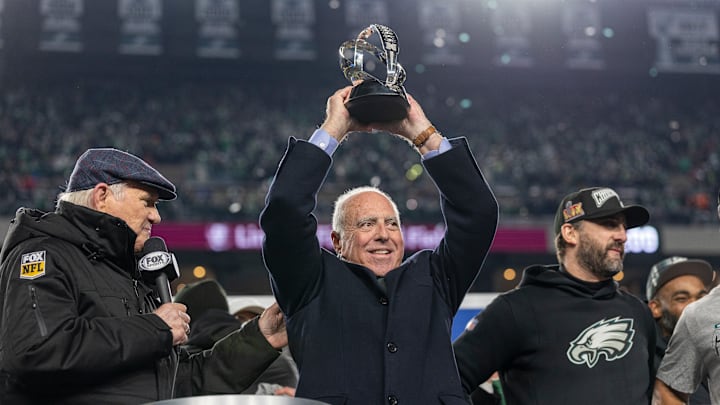Thanks to one of the most dominant running games in recent memory, the Philadelphia Eagles find themselves back in the Super Bowl for the second time in three years, looking to avenge their previous loss to the Kansas City Chiefs in New Orleans on Sunday night. But a win would mean a lot more than just revenge: It would also earn the franchise its second Lombardi Trophy, on the heels of their memorable win over the New England Patriots in 2018 (a game that permanently etched the phrase "Philly Special" into the football pantheon).
It would also cap a full quarter century of excellence for what's become one of the NFL's model franchises. Just four teams (the New England Patriots, Pittsburgh Steelers, Green Bay Packers and Baltimore Ravens) have won more games since 2000 than Philly, and only the Pats have appeared in more playoff games. The Eagles have been contenders far, far more often than not in recent history, and they show no signs of slowing down any time soon.
While GM Howie Roseman has a lot to do with that (as do stars like Jalen Hurts and Saquon Barkley), it's also worth giving some props to the man at the very top. So let's take a look at who exactly owns the Eagles franchise, and where their wealth comes from.
Who owns the Philadelphia Eagles?
The Eagles are owned by Jeffrey Lurie, who acquired the team from billionaire Norman Braman for $195 million back in May of 1994. At the time, the team was drifting a bit, having missed the playoffs for two straight seasons in the wake of Buddy Ryan's controversial firing. It didn't take long for Lurie to put his stamp on the franchise, hiring new head coach Ray Rhodes less than a year later.
After a 3-13 season in 1998, Lurie replaced Rhodes with Andy Reid, a decision that would help the franchise reach a new level of competitiveness. Reid went 11-5 in his second season at the helm, and since the year 2000, Philly has only missed the playoffs nine times in 25 years. "Go Birds" has become a rallying cry around the city and far beyond, and Lurie's $195 million investment is now worth a cool $2.65 billion according to Forbes.
Not that Lurie needed the money in the first place, of course.
Lurie family wealth and net worth, explained
Lurie's grandfather, Philip Smith, was the founder of General Cinema, a Boston-based company that grew from one of the largest drive-in theater chains in the country to a multibillion-dollar conglomerate that had its hands in everything from publishing houses to insurance companies to fashion.
Lurie got started in the family business, working in film production for General Cinema before branching out with his own production company, Chestnut Hill Productions. Chestnut Hill developed movies that would be produced by major studios like Universal and Tri-Star, growing Lurie's net worth in the process.
Eventually, his attention turned to owning a sports franchise — with the hometown Patriots looming as an obvious choice. He made an effort to acquire the team in 1993, but his bid fell short. Five months later, he successfully purchased the Eagles, and the rest is history.
As of 2024, Forbes estimated the Lurie family's net worth at $5.3 billion, ranking him 247th on the list of the 400 richest people in America.
